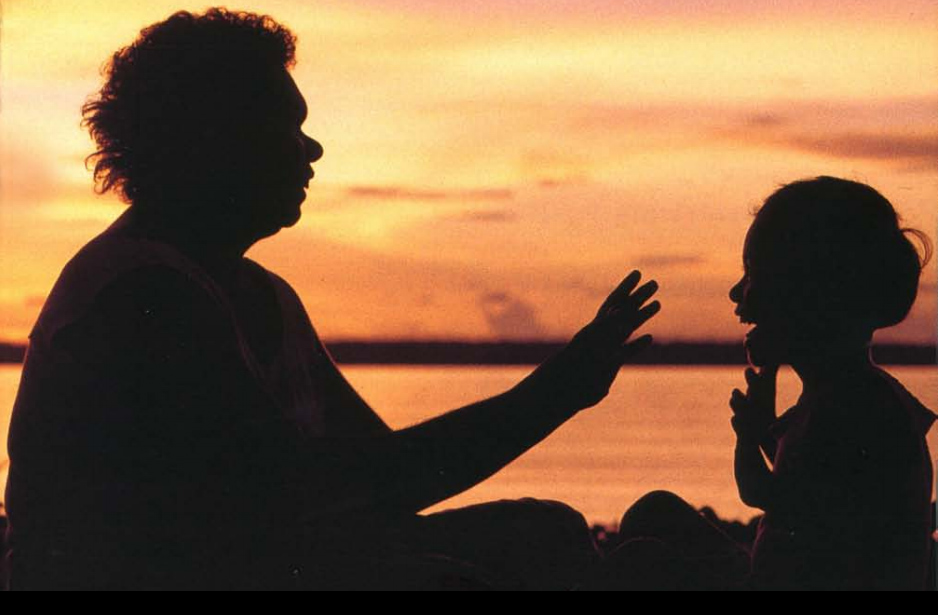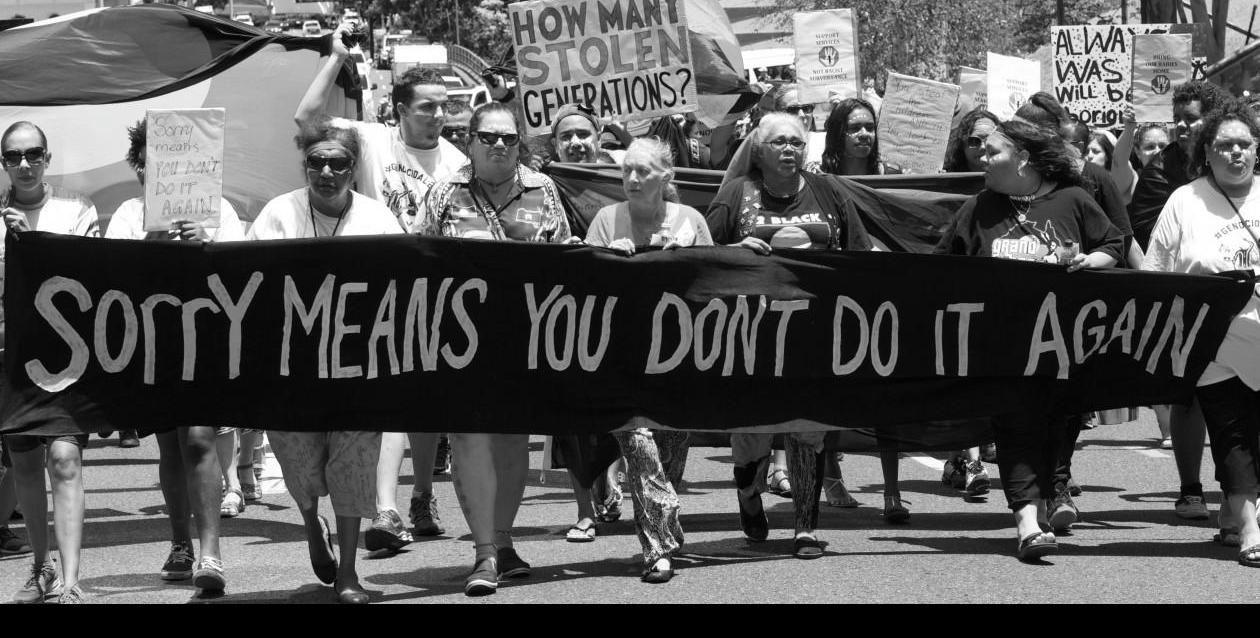The ‘Stolen Generations’ refers to Aboriginal or Torres Strait Islander people who were separated from their family, Community, culture and country.
‘Separated’ can mean they were forcibly removed or taken under government laws that sought to 'assimilate' Aboriginal people or raise them to be the same as white people and deny our culture. Many children were removed to institutions such as children’s homes or orphanages or were fostered to non-Aboriginal families. They were frequently prevented from contacting their families or staying connected with Community and culture.
The truth is that the past is very much with us today, in the continuing devastation of the lives of Indigenous Australians. That devastation cannot be addressed unless the whole community listens with an open heart and mind to the stories of what has happened in the past and, having listened and understood, commits itself to reconciliation – Bringing them Home Report
National Inquiry into the Separation of Aboriginal Children from Their Families
In 1995 the Federal Attorney-General launched the National Inquiry into the Separation of Aboriginal and Torres Strait Islander Children from Their Families. This Inquiry was conducted by the Human Rights and Equal Opportunity Commission (HREOC). This was the first official inquiry into the Stolen Generations. It aimed to: “Trace and report on past laws, practises and policies that resulted in the separation of Aboriginal and Torres Strait Islander children from their families and the effects of those laws, practises and policies.”
Over two years, the National Inquiry took oral and written testimony from over five hundred Aboriginal and Torres Strait Islander people across Australia. They also took testimonies from Indigenous organisations, foster parents, State and Territory Government representatives, church representatives, other non-government agencies, former mission and government employees and individual members of the community.
For many of the Aboriginal and Torres Strait Islander people who gave evidence to the Inquiry, it was the first time they had been able to share their story and their pain in an official investigation.
In April 1997, the Commission handed down the final Inquiry report – Bringing them Home: Report of the National Inquiry into the Separation of Aboriginal and Torres Strait Islander Children from Their Families. This report was given to the Parliament of Australia on 26 May that year.
(Scroll down to the bottom of the page to view the report)


The Bringing Them Home Report
The Inquiry Report contained 54 recommendations about how to address and heal the effects of the forced removals and the laws and policies Australian governments on Aboriginal and Torres Strait Islander peoples. The report was also the first time that the Stolen Generations had been acknowledged officially by a national inquiry.
Some of the other recommendations of the report were:
- For all Australian parliaments and state and territory police forces to acknowledge their roles in the creation and enforcement of past laws, practises and policies and to officially apologise to the Aboriginal and Torres Strait Islander communities on behalf of their predecessors
- That reparations be made to members of the Stolen Generations including rehabilitation and monetary compensation (payment)
- That non-government agencies such as churches acknowledge their roles and make formal apologies
- That the history of the Stolen Generations and the continuing effects on survivors and the Community be taught in primary and secondary schools
- That professionals working with the Aboriginal Community receive training about the history and effects of forcible removal
- That governments establish support services for Aboriginal people seeking to find their families.
A documentary about the Stolen Generations aimed at school children.


Image: Grandmothers Against Removals (GMAR). Facebook.
Aftermath of the Bringing them Home Report
Link Up Victoria
In line with the recommendations of the Bringing them Home report, Link Up services for Aboriginal people affected by the Stolen Generations to find their family were established across Australia.
Link-Up Victoria provides support for Stolen Generations members to find their family and for family to find members who were stolen. Link-Up also helps anyone who was adopted, fostered, placed in an institution under other government legislation.
Link-Up Victoria assists the Stolen Generations to confidently reclaim their Aboriginal identity, to wholeheartedly embrace their Aboriginal heritage, to happily return back into the caring arms of their people and to proudly walk on their Country. Their work is about breaking the cycle of assimilation that began a long time ago when the governments of this country decided that it was best for Aboriginal babies and children who came under their care to not know who they were, where they came from and who they belonged to.
You need to be 18 years of age and over and resident in Victoria or Tasmania to be eligible for Link-Up’s services. Their support service is confidential, sensitive and culturally responsive.
To find out more about Link-Up Victoria click here. If you live elsewhere in Australia click here to find your nearest Link Up or Stolen Generations service.
A Link-Up Victoria Film that asks: What is it like to be raised up by others?
National Sorry Day
National Sorry Day is held every year on 26 May to mark the anniversary of the tabling of the Bringing the Home report in Federal Parliament in 1997. The day is held to acknowledge the devastation caused to our families and Communities due the forced removal of our children from their families resulting in the Stolen Generations.
Each year, events, marches, speeches and presentations are held around the country to acknowledge and recognise the experiences of Stolen Generations members. It is also a time to reflect on the work that still needs to occur to heal the pain caused by past government policies and the change that needs to occur to stop Aboriginal children from being removed from their families in the future.
Apology to the Stolen Generations
In 2008, the newly elected Prime Minister Kevin Rudd made an apology to the Stolen Generations in Parliament House in Canberra, on behalf of the Government of Australia. Many Stolen Generations members gathered at Parliament House to hear the apology.
The Apology was a significant event across Australia. Big screens were set up in parks and communal areas as everyone watched Kevin Rudd speak of the wrongs governments had inflicted on Aboriginal and Torres Strait Islander peoples across Australia. A huge wave of tears, relief and applause flowed at the end of his speech.
You can find out more about the Apology by reading the Deadly Story Historical Timeline article.


Image: Heide Smith - The Tiwi Collection
The Point (NITV) discusses the social issues still affecting Aboriginal people in the 20 years that has passed since the 'Bringing Them Home' report was released.
Stolen Generations’ Testimonies
The ‘Stolen Generations’ Testimonies’ project is an initiative to record on film the personal testimonies of Australia’s Stolen Generations Survivors and share them online. In 2009 more than thirty Stolen Generations’ Survivors shared their stories, their memories and themselves in the first round of interviews for the ‘Stolen Generations’ Testimonies Foundation.’
Each testimony is recorded with transcripts available to download. To view these stories, click here. It is important that we listen to these stories and work to heal from this sad past.
Resources
- Apology to the Stolen Generations Timeline Entry by Deadly Story
- After the Apology (2017)
The rate of Aboriginal child removal has increased since the apology to the Stolen Generations in 2008. This documentary shares the stories of people affected by these ongoing removals and those fighting to stop it and keep Aboriginal children in Aboriginal care. - Stolen Generations Resource Kit for Teachers and Students by the Healing Foundation.
Sources used in writing this article:
-
Bringing Them Home
Report of the National Inquiry into the Separation of Aboriginal and Torres Strait Islander Children from Their Families.Download
